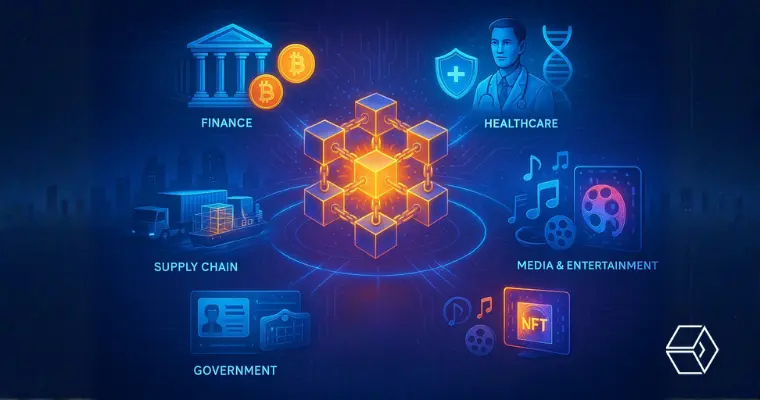
Blockchain technology has evolved from its Bitcoin beginnings and into a major digital trust and transparency layer. The communication protocol, which was originally meant for the system to transmit electronic money between two parties, has transformed into a network of various industries using the power of smart contracts, tokenization, and decentralized data systems, among others.
Blockchain technology exists in three different types: public blockchains (Ethereum & Bitcoin), which are accessible by everyone; private blockchains (R3 Corda) which cannot be accessed by individuals without authorization; and consortiums which is something that businesses choose to use.
Blockchain use cases vary across major sectors of the market where the respective industry can show justifiable outcomes and measurable impact. Finance, healthcare, supply chain, and media are among the sectors that are embracing the promise of blockchain and are adopting it as a practice.
Blockchain Use Cases by Industry
Financial Services: The Leading Adopter
The finance industry was the first and still is the biggest consumer of blockchain opportunities. In addition to cryptocurrencies, banks and fintechs rely on blockchain for DeFi (Decentralized Finance), remittances, and Central Bank Digital Currencies (CBDCs).
In 2025, JPMorgan Chase opened its cross-border settlements for institutional clients via its Onyx blockchain network and reduced transaction time considerably. Integrity of transactions, reduction of fees, and increased security are the three reasons why global finance cannot do without blockchain technology.
Healthcare: Fastest Growing Sector
Healthcare has emerged as one of the leading sectors using blockchain technology, almost exclusively for patient data management and drug traceability.
Pfizer and Merck, for example, make use of the technology for drug anti-counterfeiting, while Novartis and Boehringer are for clinical trial data management. Additionally, Roche and Amgen use it for supply chain management improvement.
For hospitals and pharmaceutical companies using blockchain, sharing sensitive information securely and at the same time allowing transparency and consent-driven access is imperative.
Supply Chain Management: Proven Value Delivery
Supply chains depend on traceability, which is what blockchain provides effortlessly. Firms are implementing distributed ledgers to log every supplier transaction to ensure authenticity and thwart fraud.
FedEx and DHL are partnering with next-gen blockchain-based tracing systems with a view to achieve global shipping visibility. Logistics companies are realizing real-time stock validation and enhanced supplier responsibility by linking IoT with blockchain.
Government and Public Sector Applications
Multiple governments around the globe are experimenting with blockchain technology to secure digital identities, voting systems, and land registry digitization.
In 2025, Estonia became the first country to expand its digital identity system, based on blockchain technology, allowing citizens to check ownership of land records safely online. Likewise, the Indian state of Telangana is conducting a pilot project for blockchain-based birth and death registries to improve transparency.
The above-mentioned efforts are not only safeguarding data integrity but also eliminating corruption and reducing paperwork.
Media, Entertainment & IP
Blockchain has been a dependable ally in the creative economy, getting a new lease of life through NFTs and digital rights management systems powered by it. The Warner Music Group has set up a blockchain-based IP registry for musicians that features royalty tracking across streaming services in an absolutely transparent manner.
Furthermore, blockchain lets artists turn their work into digital assets, sell them directly to fans, and still hold on to their ownership rights, which is a major step forward in the area of digital IP protection.
Patterns in Adoption: Matching Blockchain Types to Industry Needs
Industries using blockchain have their own models. Public blockchains (like Ethereum or Solana) provide the necessary features for decentralized blockchain applications and NFTs grant users the benefits of openness and transparency.
Private and permissioned blockchains are the dominant options for enterprise and government transactions due to their scalability and the control they provide over data. Take, for example, Hyperledger Fabric, which is used in the healthcare and supply chain sector, while Corda is the one used for settling between banks.
This pattern indicates that the adoption of blockchain is following the need for compliance, privacy, and transaction speed that are specific to each industry.
Future of Blockchain in Industries
Blockchain technology by 2030 will become the backbone of main enterprise operations, with an extended use in new areas such as energy trading, education, and real estate tokenization. As interoperability standards evolve and regulations mature, blockchain is expected to become a mainstream digital trust infrastructure across all industries.
From Promise to Practice
Blockchain use cases have moved from a theoretical promise to something tangible that creates value. Across finance, healthcare, logistics, and media, it delivers transparency, efficiency, and accountability. The coming decade will see industries converge on hybrid blockchain ecosystems, merging decentralization’s power with enterprise-grade control. For businesses, the time to integrate blockchain is now.



